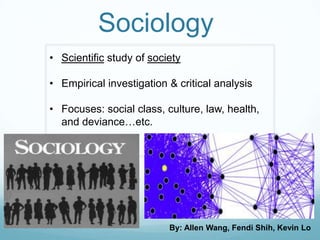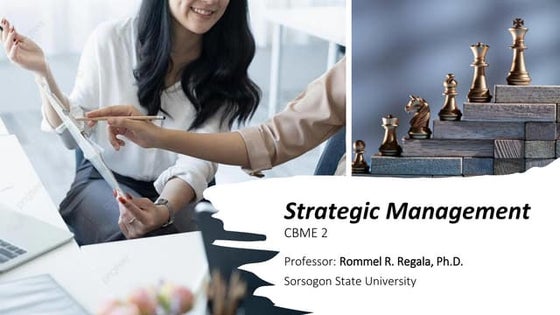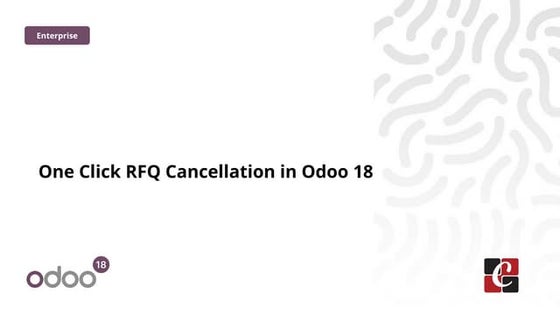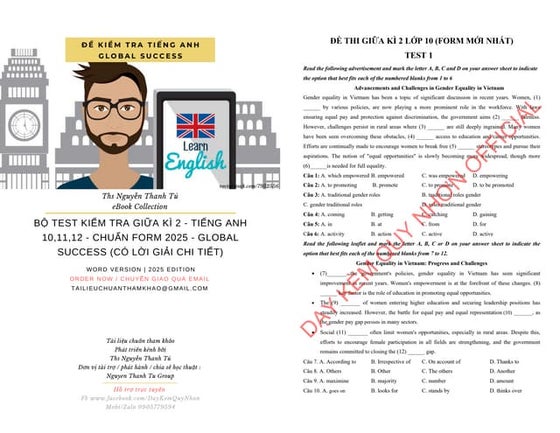Sociology
Download as PPTX, PDF3 likes988 views
Sociology is the scientific study of society that focuses on social class, culture, law, health, and deviance through empirical investigation and critical analysis. It aims to understand human social activities and determine laws governing human behaviors by distinguishing them from social processes. Some key contributors include Plato, Auguste Comte, Karl Marx, and Emile Durkheim. Common research methods include quantitative methods like experiments and surveys as well as qualitative methods like observation. Major challenges include addressing subjectivity, inconsistency, and individual differences when studying humans and society.
1 of 10
Downloaded 40 times










Recommended
Rdm01 presentation january 2014



Rdm01 presentation january 2014Diana Brighouse
Ėý
This document outlines the literature review for a research project investigating whether the creative process can be used to explore a personal experience of bipolar disorder. It discusses three main areas: the creative process, bipolar disorder, and methodologies. Autoethnography is proposed as a methodology that acknowledges the researcher's power to explore their own life experiences. The creative process and autoethnography would be combined, using a spectrum from analytic to evocative approaches. 'Data' may include diaries, artworks, images and videos. The research would have academic and patient audiences. Ethics considerations are also important when using oneself as a research subject.Social Research: Binary and reflexivity



Social Research: Binary and reflexivitySameena Siddique
Ėý
Binary refers to a pair of related but opposing concepts that provide meaning and structure to language, thought, and social reality. Claude Levi-Strauss introduced the concept of binary opposition, where narratives rely on conflicts between two opposing qualities or terms to understand elements in social reality. Reflexivity refers to researchers critically examining their own beliefs and biases and how these shape their research methods and findings. Anthony Giddens argued that only societies capable of reflexively modifying institutions can adapt to social change, and that sociology enables this reflexivity by providing understanding of social positions.Social Research: Nature of Reality



Social Research: Nature of RealitySameena Siddique
Ėý
This document discusses the nature of social reality and epistemological debates in the social sciences. It outlines three key pairs of epistemological debates: positivism vs historicism, logical empiricism vs dialectical theory, and realism vs constructivism. It also discusses the development of social philosophy from early European influences to more modern alternatives like phenomenology, ethnomethodology, and the social construction of reality. Postmodern challenges to positivism are also mentioned. Sociology Definitions by Liaqat Hussain 



Sociology Definitions by Liaqat Hussain Liaqat Jogi .
Ėý
Sociology is defined by several scholars as the systematic study of human society and social behavior, including social action and social organization. Key figures in the development of sociology as a social science include Auguste Comte, who coined the term in 1836, Herbert Spencer, Karl Marx, Emile Durkheim, and Max Weber. Sociology is characterized as an independent science that studies society in a generalizing rather than individualizing way through both rational and empirical means. Major subjects of sociological inquiry include theory, history, family, community, religion, education, politics, law, economics, knowledge, and social problems.SociologyExchange.co.uk Shared Resource



SociologyExchange.co.uk Shared Resourcesociologyexchange.co.uk
Ėý
Sociology is the study of social groups and society. It examines how society is organized and how social factors influence individual and group behavior. Sociology analyzes social structures, social change, social institutions, and social relationships. Studying sociology can change one's perspective on societal structures and challenge assumptions about how society functions.Introduction to sociology



Introduction to sociologySri Lanka International Buddhist Academy
Ėý
This document provides an introduction to sociology as the study of human society and social interaction. It defines sociology as the science of society or social phenomena. The document outlines the key topics of sociology including definitions of society, the subject matter, nature and scope of sociology. It concludes that sociology offers a way to understand the social world and trains students to think critically about human social life.Aahuti Epidemic and Literature _National_Webinar 



Aahuti Epidemic and Literature _National_Webinar Aahuti Dhandhukia
Ėý
The document summarizes a webinar on the COVID-19 pandemic and literary responses on social media. It discusses how epidemics have impacted humanity throughout history. It outlines the objectives of studying contemporary literary works responding to the pandemic on social media. Examples are provided of microfiction and free verse posted on Facebook addressing themes like lockdowns, migration, and government policies. The responses often relate to current events and challenge societal values. Literary forms emerging on social media are considered significant reflections of the present climate.Developing research skills



Developing research skillsUK Centre for Legal Education
Ėý
This document discusses developing research skills and addresses current issues and potential solutions in legal research. It notes a decline in empirical research and dominance of doctrinal work. It proposes solutions like encouraging creativity, experiential learning, interdisciplinary tasks, and blended learning. It suggests new courses and resources to support growth in empirical research. Finally, it raises questions about achieving Boyer's model of scholarship and employing tools to encourage more empirical research.Introduction to research



Introduction to researchMark Angelo Bernaldez
Ėý
Research is defined as a systematic process of investigation to find answers to problems. The main purposes of research are to provide solutions to problems and improve science, technology, and quality of life. Research can be categorized based on its inquiry approach, purpose, methodology, and measuring instruments. Some key types are basic research, applied research, descriptive research, experimental research, and historical research. Valid and reliable measuring instruments are important for collecting high-quality data and drawing correct conclusions from a research study.Empirical research methods for software engineering



Empirical research methods for software engineeringsarfraznawaz
Ėý
This document outlines guidelines for empirical research methods in software engineering. It discusses case studies, experimental research, surveys, and post-mortem analysis. For each method, it provides examples and discusses how the method can be used to study software engineering problems. It also lists detailed guidelines for different aspects of empirical research, such as experimental context and design, data collection, analysis, and presentation and interpretation of results. The goal of the guidelines is to improve the quality and rigor of empirical studies in software engineering.Empirical research process



Empirical research processGregor PolanÄiÄ
Ėý
šÝšÝßĢs, dedicated to the process of performing empirical research.

Sociology of food: "What did you have for dinner?â Empirical Questions and Pr...Jean-Pierre Poulain
Ėý
A lecture given in Helsinki in a seminar organized by Alan WardeIdentifying An Empirical Research Article



Identifying An Empirical Research Articlewsuinst
Ėý
1) The document defines empirical research as research based on experience or data derived from observation or experiment.
2) Empirical research articles typically include five main components: an introduction and literature review, a description of the methodology, a presentation of the results, a discussion or conclusion section, and references.
3) The introduction and literature review section provides the need for the research, states the research question or hypothesis, and reviews previous literature on the topic. The methodology section describes how the data was collected. The results section presents the findings of the research. The discussion or conclusion section interprets the results and implications. References list the sources cited in the article.Empirical Research presentation



Empirical Research presentationmichyli
Ėý
The document outlines an empirical research project studying the pedestrian scheme on Sai Yeung Choi Street South in Mong Kok, Hong Kong. It includes a presentation outline, background on the street, hypotheses and research questions, and details on the research methods used. Observations were made on weekdays and weekends, with and without the pedestrian scheme, noting activities, interactions, atmosphere and signs. The findings will help evaluate how the pedestrian scheme influences daily activities and sociability on the street.Garner c17



Garner c17Beulah Heights University
Ėý
This chapter discusses different levels of observation in sociological research from unobtrusive to participatory observation. It addresses choosing an appropriate level based on the research questions and ethics considerations. Guidelines are provided for gaining access to research sites, using key informants, recording field notes, and analyzing data through analytic memos. Spatial mapping, time scheduling, and shadowing techniques are recommended for beginning observational research.Sociology 101 Chapter Two



Sociology 101 Chapter Twoerika rodriguez
Ėý
The document discusses three main frameworks for sociological investigation:
1) Scientific sociology, which bases knowledge on direct systematic observation using empirical evidence and aims for objectivity.
2) Interpretive sociology, which focuses on understanding the meanings and reasons behind people's social behaviors.
3) Critical sociology, which examines society with the goal of identifying needed social changes towards democracy and social justice.
It also outlines common sociological research methods like experiments, surveys, interviews, and participant observation.Social control



Social controlpenny123456
Ėý
There are two categories of social control - formal and informal. Formal social control involves established laws and institutions like the police, courts, and prisons that enforce rules through punishments. Informal social control consists of unwritten social norms enforced through socialization by agents like family, teachers, and peer groups using positive and negative sanctions like praise, acceptance, and disapproval. Social control, whether formal or informal, works to ensure members of a society adhere to its shared norms, values, and laws.Questionnaires (AS Sociology Research Methods)



Questionnaires (AS Sociology Research Methods)Mehek Iqbal
Ėý
Designing a questionnaire, pre-coded or closed, open-ended or open, postal/mail or online self-completionL6 interviews



L6 interviewssmccormac7
Ėý
Structured interviews use a fixed set of closed-ended questions to quantify answers, while unstructured interviews use open-ended questions in a conversational format to obtain qualitative data. Semi-structured interviews employ a list of topics and questions but allow the interviewer flexibility to probe for more information. The document discusses advantages and disadvantages of each type of interview for obtaining valid and reliable data in sociological research.Agencies of social control(social work)



Agencies of social control(social work)Sindhu Naga
Ėý
its about the agencies that help people in making social and controlling them. these are the agencies that control a person. this especially deals with the subject of social work9 Social Control POWERPOINT



9 Social Control POWERPOINTmattyp99
Ėý
The document discusses three strategies for preventing crime: situational crime prevention, environmental crime prevention, and social and community crime prevention. It evaluates these strategies, noting that they focus on a narrow range of harms like violent crime and burglary, rather than "crimes of the powerful" or environmental crimes. The document cites a survey that found crime prevention partnerships were interested in targeting crimes like car theft and drugs, but had no interest in waste offenses or pollution that impacts community health.AS Theoretical Issues



AS Theoretical IssuesApril Lennox-Hill's Sociology Lessons
Ėý
There are four main theoretical issues in sociology: validity, reliability, representativeness, and methodological perspective. Validity refers to obtaining an accurate picture of society, while reliability means replicable results. Representativeness means studying a typical cross-section. Methodological perspective influences method choice, with positivists preferring quantitative data to find patterns and interpretivists preferring qualitative data to understand meanings. Constraints like time, resources, access, and consent also influence which methods sociologists can use to study their topics.AS Sociology: Ethical Factors Influencing Choice of Methods



AS Sociology: Ethical Factors Influencing Choice of MethodsApril Lennox-Hill's Sociology Lessons
Ėý
The document discusses five ethical guidelines that sociologists should follow when conducting research according to the British Sociological Association (BSA). The guidelines are: 1) obtaining informed consent from research participants; 2) maintaining participants' confidentiality and privacy; 3) being aware of and preventing any negative effects on participants; 4) taking extra care when studying vulnerable groups; and 5) avoiding covert research which violates informed consent. The document instructs students to review the BSA's website for examples where it may be acceptable to ignore these principles and bring any such examples to the next class.Social control



Social controlVellore Institute of Technology (VIT)
Ėý
This document discusses various aspects of social control. It defines social control as the methods used by society to influence and regulate individual behavior to maintain social order. It identifies both formal and informal means of social control, such as law, education, religion, norms, values, folkways, mores, customs, and fashion. The role of these different social controls is to promote social stability by enforcing shared standards of conduct. As members of society, nurses must understand social controls and how deviations from these norms can impact health.Social control theory



Social control theoryrplatos
Ėý
Travis Hirschi developed the Social Bond Theory to explain criminal behavior. He argued that individuals are less likely to commit crimes when they have strong social bonds like attachment to family, commitment to education/career, involvement in conventional activities, and belief in moral norms. Regarding juvenile delinquency, Hirschi believed it occurs when the social bonds between children and society are weakened. Providing youth with positive social bonds through support systems, guidance, and clear expectations can help reduce future criminal behavior according to the theory of social control. interview as data collection tool



interview as data collection toolALIGARH MUSLIM UNIVERSITY
Ėý
This document discusses various qualitative research methods including focus groups, depth interviews, home interviews, mall intercept interviews, and computer-assisted personal interviews. It provides details on how each method is conducted, characteristics of each, advantages and disadvantages. Focus groups involve interviewing 8-12 participants in a group setting to obtain insights through discussion. Depth interviews explore attitudes and opinions through one-on-one, open-ended interviews.Collection of Data



Collection of DataRoqui Malijan
Ėý
This document discusses various methods and considerations for collecting and analyzing data. It describes primary and secondary data sources and qualitative and quantitative methods. It also discusses different research tools like questionnaires, interviews, and mechanical devices. Guidelines are provided for developing questionnaires and conducting interviews. Different types of questions, interview formats, and potential issues are outlined. Overall, the document provides an overview of data collection methods and best practices for tools like questionnaires and interviews. Data Collection by Interview Method



Data Collection by Interview MethodAkash Dhar
Ėý
The document discusses different methods for collecting data through interviews. It describes interview methods as a way to gather information from individuals to compare situations and analyze real-time data. Various types of interviews are outlined, including personal, telephonic, group, individual, and depth interviews. Advantages of interviews include obtaining more information, an ability to reorder questions, and potentially more honest answers through personal interaction. However, interviews also have disadvantages like being an expensive method, potential for interviewer or response bias, taking a long time, and requiring trained resources.Sociologyunit1powerpoint 140222062818-phpapp02



Sociologyunit1powerpoint 140222062818-phpapp02Cleophas Rwemera
Ėý
This document outlines the key concepts and lessons for Unit 1 of a sociology course. The unit will examine the foundations and origins of sociology, the three major theoretical perspectives in sociology, and how sociological research is conducted. Students will learn about the development of sociology as an academic discipline in response to social changes in Europe. They will also explore the functionalist, conflict, and interactionist perspectives and how sociologists use various methods like surveys, experiments, and observation to study social phenomena scientifically. introduction-to-sociology-and-anthropology



introduction-to-sociology-and-anthropologyJoseph Salimbangon
Ėý
The document outlines the principles of sociology and anthropology as academic disciplines. It discusses the key areas and branches of each field. Sociology involves the scientific study of human interaction and social processes. It examines groups, institutions, and social change. Anthropology focuses on the study of human culture, behavior, and evolution across time and space. The main branches of anthropology described are physical, cultural, archaeology, and linguistics. Both sociology and anthropology aim to understand human societies and cultures through empirical, objective study.More Related Content
Viewers also liked (20)
Introduction to research



Introduction to researchMark Angelo Bernaldez
Ėý
Research is defined as a systematic process of investigation to find answers to problems. The main purposes of research are to provide solutions to problems and improve science, technology, and quality of life. Research can be categorized based on its inquiry approach, purpose, methodology, and measuring instruments. Some key types are basic research, applied research, descriptive research, experimental research, and historical research. Valid and reliable measuring instruments are important for collecting high-quality data and drawing correct conclusions from a research study.Empirical research methods for software engineering



Empirical research methods for software engineeringsarfraznawaz
Ėý
This document outlines guidelines for empirical research methods in software engineering. It discusses case studies, experimental research, surveys, and post-mortem analysis. For each method, it provides examples and discusses how the method can be used to study software engineering problems. It also lists detailed guidelines for different aspects of empirical research, such as experimental context and design, data collection, analysis, and presentation and interpretation of results. The goal of the guidelines is to improve the quality and rigor of empirical studies in software engineering.Empirical research process



Empirical research processGregor PolanÄiÄ
Ėý
šÝšÝßĢs, dedicated to the process of performing empirical research.

Sociology of food: "What did you have for dinner?â Empirical Questions and Pr...Jean-Pierre Poulain
Ėý
A lecture given in Helsinki in a seminar organized by Alan WardeIdentifying An Empirical Research Article



Identifying An Empirical Research Articlewsuinst
Ėý
1) The document defines empirical research as research based on experience or data derived from observation or experiment.
2) Empirical research articles typically include five main components: an introduction and literature review, a description of the methodology, a presentation of the results, a discussion or conclusion section, and references.
3) The introduction and literature review section provides the need for the research, states the research question or hypothesis, and reviews previous literature on the topic. The methodology section describes how the data was collected. The results section presents the findings of the research. The discussion or conclusion section interprets the results and implications. References list the sources cited in the article.Empirical Research presentation



Empirical Research presentationmichyli
Ėý
The document outlines an empirical research project studying the pedestrian scheme on Sai Yeung Choi Street South in Mong Kok, Hong Kong. It includes a presentation outline, background on the street, hypotheses and research questions, and details on the research methods used. Observations were made on weekdays and weekends, with and without the pedestrian scheme, noting activities, interactions, atmosphere and signs. The findings will help evaluate how the pedestrian scheme influences daily activities and sociability on the street.Garner c17



Garner c17Beulah Heights University
Ėý
This chapter discusses different levels of observation in sociological research from unobtrusive to participatory observation. It addresses choosing an appropriate level based on the research questions and ethics considerations. Guidelines are provided for gaining access to research sites, using key informants, recording field notes, and analyzing data through analytic memos. Spatial mapping, time scheduling, and shadowing techniques are recommended for beginning observational research.Sociology 101 Chapter Two



Sociology 101 Chapter Twoerika rodriguez
Ėý
The document discusses three main frameworks for sociological investigation:
1) Scientific sociology, which bases knowledge on direct systematic observation using empirical evidence and aims for objectivity.
2) Interpretive sociology, which focuses on understanding the meanings and reasons behind people's social behaviors.
3) Critical sociology, which examines society with the goal of identifying needed social changes towards democracy and social justice.
It also outlines common sociological research methods like experiments, surveys, interviews, and participant observation.Social control



Social controlpenny123456
Ėý
There are two categories of social control - formal and informal. Formal social control involves established laws and institutions like the police, courts, and prisons that enforce rules through punishments. Informal social control consists of unwritten social norms enforced through socialization by agents like family, teachers, and peer groups using positive and negative sanctions like praise, acceptance, and disapproval. Social control, whether formal or informal, works to ensure members of a society adhere to its shared norms, values, and laws.Questionnaires (AS Sociology Research Methods)



Questionnaires (AS Sociology Research Methods)Mehek Iqbal
Ėý
Designing a questionnaire, pre-coded or closed, open-ended or open, postal/mail or online self-completionL6 interviews



L6 interviewssmccormac7
Ėý
Structured interviews use a fixed set of closed-ended questions to quantify answers, while unstructured interviews use open-ended questions in a conversational format to obtain qualitative data. Semi-structured interviews employ a list of topics and questions but allow the interviewer flexibility to probe for more information. The document discusses advantages and disadvantages of each type of interview for obtaining valid and reliable data in sociological research.Agencies of social control(social work)



Agencies of social control(social work)Sindhu Naga
Ėý
its about the agencies that help people in making social and controlling them. these are the agencies that control a person. this especially deals with the subject of social work9 Social Control POWERPOINT



9 Social Control POWERPOINTmattyp99
Ėý
The document discusses three strategies for preventing crime: situational crime prevention, environmental crime prevention, and social and community crime prevention. It evaluates these strategies, noting that they focus on a narrow range of harms like violent crime and burglary, rather than "crimes of the powerful" or environmental crimes. The document cites a survey that found crime prevention partnerships were interested in targeting crimes like car theft and drugs, but had no interest in waste offenses or pollution that impacts community health.AS Theoretical Issues



AS Theoretical IssuesApril Lennox-Hill's Sociology Lessons
Ėý
There are four main theoretical issues in sociology: validity, reliability, representativeness, and methodological perspective. Validity refers to obtaining an accurate picture of society, while reliability means replicable results. Representativeness means studying a typical cross-section. Methodological perspective influences method choice, with positivists preferring quantitative data to find patterns and interpretivists preferring qualitative data to understand meanings. Constraints like time, resources, access, and consent also influence which methods sociologists can use to study their topics.AS Sociology: Ethical Factors Influencing Choice of Methods



AS Sociology: Ethical Factors Influencing Choice of MethodsApril Lennox-Hill's Sociology Lessons
Ėý
The document discusses five ethical guidelines that sociologists should follow when conducting research according to the British Sociological Association (BSA). The guidelines are: 1) obtaining informed consent from research participants; 2) maintaining participants' confidentiality and privacy; 3) being aware of and preventing any negative effects on participants; 4) taking extra care when studying vulnerable groups; and 5) avoiding covert research which violates informed consent. The document instructs students to review the BSA's website for examples where it may be acceptable to ignore these principles and bring any such examples to the next class.Social control



Social controlVellore Institute of Technology (VIT)
Ėý
This document discusses various aspects of social control. It defines social control as the methods used by society to influence and regulate individual behavior to maintain social order. It identifies both formal and informal means of social control, such as law, education, religion, norms, values, folkways, mores, customs, and fashion. The role of these different social controls is to promote social stability by enforcing shared standards of conduct. As members of society, nurses must understand social controls and how deviations from these norms can impact health.Social control theory



Social control theoryrplatos
Ėý
Travis Hirschi developed the Social Bond Theory to explain criminal behavior. He argued that individuals are less likely to commit crimes when they have strong social bonds like attachment to family, commitment to education/career, involvement in conventional activities, and belief in moral norms. Regarding juvenile delinquency, Hirschi believed it occurs when the social bonds between children and society are weakened. Providing youth with positive social bonds through support systems, guidance, and clear expectations can help reduce future criminal behavior according to the theory of social control. interview as data collection tool



interview as data collection toolALIGARH MUSLIM UNIVERSITY
Ėý
This document discusses various qualitative research methods including focus groups, depth interviews, home interviews, mall intercept interviews, and computer-assisted personal interviews. It provides details on how each method is conducted, characteristics of each, advantages and disadvantages. Focus groups involve interviewing 8-12 participants in a group setting to obtain insights through discussion. Depth interviews explore attitudes and opinions through one-on-one, open-ended interviews.Collection of Data



Collection of DataRoqui Malijan
Ėý
This document discusses various methods and considerations for collecting and analyzing data. It describes primary and secondary data sources and qualitative and quantitative methods. It also discusses different research tools like questionnaires, interviews, and mechanical devices. Guidelines are provided for developing questionnaires and conducting interviews. Different types of questions, interview formats, and potential issues are outlined. Overall, the document provides an overview of data collection methods and best practices for tools like questionnaires and interviews. Data Collection by Interview Method



Data Collection by Interview MethodAkash Dhar
Ėý
The document discusses different methods for collecting data through interviews. It describes interview methods as a way to gather information from individuals to compare situations and analyze real-time data. Various types of interviews are outlined, including personal, telephonic, group, individual, and depth interviews. Advantages of interviews include obtaining more information, an ability to reorder questions, and potentially more honest answers through personal interaction. However, interviews also have disadvantages like being an expensive method, potential for interviewer or response bias, taking a long time, and requiring trained resources.

Sociology of food: "What did you have for dinner?â Empirical Questions and Pr...Jean-Pierre Poulain
Ėý
Similar to Sociology (20)
Sociologyunit1powerpoint 140222062818-phpapp02



Sociologyunit1powerpoint 140222062818-phpapp02Cleophas Rwemera
Ėý
This document outlines the key concepts and lessons for Unit 1 of a sociology course. The unit will examine the foundations and origins of sociology, the three major theoretical perspectives in sociology, and how sociological research is conducted. Students will learn about the development of sociology as an academic discipline in response to social changes in Europe. They will also explore the functionalist, conflict, and interactionist perspectives and how sociologists use various methods like surveys, experiments, and observation to study social phenomena scientifically. introduction-to-sociology-and-anthropology



introduction-to-sociology-and-anthropologyJoseph Salimbangon
Ėý
The document outlines the principles of sociology and anthropology as academic disciplines. It discusses the key areas and branches of each field. Sociology involves the scientific study of human interaction and social processes. It examines groups, institutions, and social change. Anthropology focuses on the study of human culture, behavior, and evolution across time and space. The main branches of anthropology described are physical, cultural, archaeology, and linguistics. Both sociology and anthropology aim to understand human societies and cultures through empirical, objective study.Amtechapter1 150714145740-lva1-app6891



Amtechapter1 150714145740-lva1-app6891Cleophas Rwemera
Ėý
This document provides an overview of sociology as a field of study. It defines sociology as the systematic study of human society and social behavior, from large institutions to small groups. It discusses key concepts like social behavior, society, and the sociological perspective. It also outlines some of the main topics studied in sociology like socialization, culture, groups, inequality, and social institutions. The document emphasizes the importance of developing a sociological imagination to understand how individual experiences are shaped by broader social and historical forces.Master Teacher



Master Teacherderrickgriffey
Ėý
This document provides an overview of sociology as a field of study. It defines sociology as the systematic study of human society and social behavior, from large institutions to small groups. It discusses key concepts like social behavior, society, and the sociological perspective. It also summarizes some of the main topics covered in sociology like socialization, culture, groups, inequality, and social institutions. The document emphasizes that sociologists study people and society objectively using methods like participant observation, surveys, and the scientific method to collect both quantitative and qualitative data.Metopen



MetopenAli Murfi
Ėý
The document outlines three main approaches to social research: positivist, interpretivist, and critical. It provides comparisons of the key assumptions and methods of each approach. The positivist approach views reality as objective and seeks to discover universal laws through quantitative methods. The interpretivist approach sees reality as subjective and aims to understand how people construct meaning through qualitative research. The critical approach seeks to critique and transform social relations by uncovering hidden truths through analytical methods like discourse analysis.introduction-to-sociology-and-anthropology.pptx



introduction-to-sociology-and-anthropology.pptxssusera8df68
Ėý
The document provides an overview of sociology and anthropology as academic disciplines. It discusses the key principles and foundations of sociology, including its focus on social processes and methods of scientific investigation. Anthropology is defined as the study of human evolution, biology, and culture. The major branches of anthropology - physical/biological anthropology, cultural anthropology, archaeology, and linguistics - are also outlined. Additionally, the document summarizes several areas of focus in sociology, including social organization, social change, population and demography, and applied sociology. Both sociology and anthropology aim to understand human social and cultural systems through empirical research methods.Sociology unit 1 power point



Sociology unit 1 power pointMrTimBradley
Ėý
This document provides an overview of the first unit of a sociology course. It includes:
- An introduction to examining social life, including defining sociology and differentiating it from other social sciences.
- An outline of the development of sociology from the 17th-19th centuries in Europe in response to industrialization and other social changes. Key early theorists who contributed to the field are identified.
- An introduction to the three major theoretical perspectives in sociology - functionalism, conflict theory, and symbolic interactionism - and how they differ in their levels of analysis.
- An overview of how sociological research is conducted scientifically, using methods like surveys, observation, and experiments while following ethical standardsUnit 1: Foundations and Methods



Unit 1: Foundations and MethodsMrTimBradley
Ėý
This document provides an overview of the first unit in a sociology course. It includes information about the first day of class procedures and an outline of topics to be covered in Unit 1. The unit will focus on examining social life, the development of sociology, modern sociological perspectives, and conducting sociological research. Students will learn about the origins of sociology, the three major theoretical perspectives (functionalism, conflict theory, and symbolic interactionism), and how sociological research follows the scientific method and ethical guidelines.Soc Ch 1 notes



Soc Ch 1 notesmrsbreedsclass
Ėý
The document provides an overview of sociology, discussing how sociologists study human society and social behavior through various theoretical perspectives and research methods. It covers the development of sociology from early European scholars to modern sociological research approaches. Key topics include the functionalist, conflict, and interactionist perspectives as well as research process, ethics, and current studies regarding topics like the spread of hip-hop culture.Lessons for sociology 1



Lessons for sociology 1Luanne San
Ėý
Sociology is the scientific study of society and human social behavior. There are three major sociological perspectives: structural functionalism, which views society as a system with interrelated parts; conflict theory, which focuses on power struggles over scarce resources; and symbolic interactionism, which examines how society shapes individuals and their interactions. Major areas of sociology include social organization, social psychology, social change, human ecology, population studies, sociological theory/research, and applied sociology. Classical sociologists who developed influential theories include Comte, Marx, Spencer, Durkheim, and Weber. Culture encompasses the knowledge, social norms, values, beliefs, and other capabilities acquired by members of a society. Key elements that shape cultureIntroduction.ppt



Introduction.pptssuser8afefa
Ėý
This document provides an introduction to a course on media studies. It discusses analyzing media for hidden meanings and influences on society. It explains how studying media can provide cross-cultural knowledge and skills applicable to future careers. It also mentions the omnipresence of media in culture and everyday life, and how media studies can help transform people into analysts. The document then introduces the concept of the "Circuit of Culture" which describes 5 interlinked moments - production, consumption, representation, identity, and regulation - through which culture becomes meaningful.Disciplines and ideas in the social sciences initial discussion



Disciplines and ideas in the social sciences initial discussionRaymund Francia
Ėý
This document discusses and compares natural science and social science. It notes that both are considered real sciences but have different origins, subjects of study, and limitations. Natural science deals with natural events using scientific methods that originated during the Renaissance, while social science emerged in the late 19th century to study human society and social interactions using methods like observation, experiments, interviews and surveys. Key differences include natural science aiming to discover natural laws through fields like physics and chemistry, while social science must interpret human behavior and faces challenges in controlling variables.SOC PRO LESSON 2.pptx



SOC PRO LESSON 2.pptxJMPAJ
Ėý
This document discusses the key concepts of social science. It defines social science as the unique study of human relationships and society. The scope of social science is as broad as human history and worldwide interactions between people. Social science emphasizes social structures, human actions, individuals, culture, and the relationship between society and the natural environment. It observes social phenomena through the dual elements of empirical analysis and the study of society. The overall aim is to characterize human nature and experience.Chapter 2 Thinking About and Researching the Social World .docx



Chapter 2 Thinking About and Researching the Social World .docxwalterl4
Ėý
Chapter 2
Thinking About and Researching the Social World
Classical Sociological Theory
âĒ What is a theory?
âĒ Theory: âA set of interrelated ideas that have a wide range of
application, deal with centrally important issues, and have stood the
test of timeâ (Ritzer, 2016).
âŦ Theories condense concepts in order to organize the social world
âŦ Sociologists use theories in order to identify and frame ideas
Influences on the Emergence of Sociological Theory
âĒ The Industrial Revolution
âĒ Political revolutions (French and American revolutions)
âĒ The rise of socialism
âĒ The civil/womenâs rights movements
âĒ The growth of science, the replacement of faith by science
Early Theorists
âĒ Auguste Comte (1798-1857)
âŦ French philosopher
ï Originally termed his studies âsocial physicsâ he eventually coined the term
âsociologyâ to distinguish his work from others.
ï He believed sociology could use science to
understand, predict, and control human behavior for
the welfare of humanity.
ï The âReligion of Humanityâ
ï Tenets: altruism, order, progress, introduction,
admission, destination, marriage, retirement, separation,
incorporation
Early Theorists
âĒ Harriet Martineau (1802â1876)
âŦ Born and Educated in England
ï Credited with bringing sociology to England
ï Argued that sociologists must focus on all aspects of society
ï Including women
ï First to look at issues such as marriage, children, domestic and
religious life as well as issues of race
ï Argued that sociologists must do more than just observe, but
should also act in ways that benefit society
ï Was active in the women's rights and emancipation movements
ï Wrote Society in America after extensive travels in the 1830âs
Early Theorists
âĒ Herbert Spencer (1820â1903)
âŦ Primarily interested in the root cause of social change, specifically evolution in
the physical, intellectual, and social domains.
âŦ Was a polymath
ï Philosopher, biologist, anthropologist, and political theorist
âŦ Coined the term âsurvival of the fittestâ
ï Believed privileged members of society earned their status and
thus a higher quality of life
ï Government should not interfere with improving life chances
of individuals â against the natural order
The Big Three
âĒ Karl Marx (1818-1883)
âŦ German â born to the middle class
âŦ Macro-theorist who focused on the structure of capitalist society
âŦ Defined capitalism as an economic system based on the
bourgeoisie (the owners of the means of production)
exploiting the proletariat (the workers).
ï Wrote in conjunction with Fredric Engles
ï The Communist Manifesto and Das Kapital
The Big Three
âĒ Karl Marx (1818-1883)
âĒ Concepts from Marx
âŦ Capitalism as a system based on exploitation
âŦ Workers also experience alienation on the job
âŦ False consciousness â an erroneous set of beliefs
âŦ Class consciousness â a set of beliefs about an individualâs
soci.PhD Coursework Presentation 1



PhD Coursework Presentation 1Aahuti Dhandhukia
Ėý
This presentation is prepared as a part of Coursework for my PhD research and was presented at Department of English, Maharaja Krishnakumarsinhji Bhavnagar University, Gujarat, India.Introduction to sociology lecture 1



Introduction to sociology lecture 1Chris Conner
Ėý
Sociology is the study of society and social groups. It emerged in the late 19th century with the founding of the Chicago school of sociology in 1892. Sociology can be done through qualitative or quantitative methods. Qualitative sociology uses interviews and observation to understand human experiences, while quantitative sociology analyzes statistics and surveys to find large-scale patterns. Both methods have strengths and limitations, so the best sociology uses a mixture of approaches. A key idea is having a "sociological imagination" to connect personal experiences to broader social and historical contexts.Ethnography and Historical Research Presentation



Ethnography and Historical Research PresentationMuhammad Nur Fadzly Basar
Ėý
Here are the answers to your questions:
1. A relic is any object whose physical or visual characteristics can provide some information about the past. Examples of relics include furniture, clothing, buildings, monuments, or equipment.
2. It is important to establish rapport with collaborators or the group being researched in order to gain their trust and willingness to participate openly and honestly. This helps the researcher obtain accurate perspectives and behaviors from participants.
3. In the technique of triangulation, the researcher collects data using multiple sources rather than a single one. This includes using multiple methods like interviews, observations, and artifacts, as well as getting information from multiple informants.
4. The researcher is immersed in theLecture 7



Lecture 7Elisa Bellotti
Ėý
This document provides an overview of using social network analysis to study cultural production. It discusses how the Manchester punk/post-punk music scene from 1976-1980 formed a cultural network among over 100 key actors. Having a "critical mass" of interconnected artists allowed resources and enthusiasm to be pooled, cultural work to be completed, and a music scene to emerge and be recognized. The network structure influenced opportunities for collaboration, support, and innovation. Studying relationships and dynamics within cultural networks can provide insights into how conventions, resources, and opportunities are distributed and how cultural production unfolds over time.Archi slides jan 2013 web version



Archi slides jan 2013 web versionenergybiographies
Ėý
This document outlines the objectives and methodology of a research project investigating community-led energy demand reduction initiatives through an analysis of people's "energy biographies". The project aims to 1) develop understanding of energy use by comparing energy biographies across different social settings, 2) examine how demand reduction interventions interact with personal biographies, and 3) improve understanding of how communities can support reduced energy consumption. The researchers are using narrative interviews, longitudinal qualitative methods, and visual methods to collect data from case sites in Wales and England. The analysis will involve coding, case biographies, qualitative longitudinal analysis, and multi-modal approaches.Natasha khan gender sexuality essay plan



Natasha khan gender sexuality essay planUniversity Of Manchester
Ėý
Sociologists have challenged the idea that gender and sexuality are natural in several ways:
1) Early sociological perspectives like sex-role theory were criticized for linking gender to naturalness.
2) Feminist perspectives in the 1970s argued that gender roles are influenced by social and political forces like divisions of labor and Marxism.
3) Post-structuralist views from the 1990s onwards established that both sex and gender are socially constructed rather than natural.Recently uploaded (20)
BISNIS BERKAH BERANGKAT KE MEKKAH ISTIKMAL SYARIAH



BISNIS BERKAH BERANGKAT KE MEKKAH ISTIKMAL SYARIAHcoacharyasetiyaki
Ėý
BISNIS BERKAH BERANGKAT KE MEKKAH ISTIKMAL SYARIAHComprehensive Guide to Antibiotics & Beta-Lactam Antibiotics.pptx



Comprehensive Guide to Antibiotics & Beta-Lactam Antibiotics.pptxSamruddhi Khonde
Ėý
ðĒ Comprehensive Guide to Antibiotics & Beta-Lactam Antibiotics
ðŽ Antibiotics have revolutionized medicine, playing a crucial role in combating bacterial infections. Among them, Beta-Lactam antibiotics remain the most widely used class due to their effectiveness against Gram-positive and Gram-negative bacteria. This guide provides a detailed overview of their history, classification, chemical structures, mode of action, resistance mechanisms, SAR, and clinical applications.
ð What Youâll Learn in This Presentation
â
History & Evolution of Antibiotics
â
Cell Wall Structure of Gram-Positive & Gram-Negative Bacteria
â
Beta-Lactam Antibiotics: Classification & Subtypes
â
Penicillins, Cephalosporins, Carbapenems & Monobactams
â
Mode of Action (MOA) & Structure-Activity Relationship (SAR)
â
Beta-Lactamase Inhibitors & Resistance Mechanisms
â
Clinical Applications & Challenges.
ð Why You Should Check This Out?
Essential for pharmacy, medical & life sciences students.
Provides insights into antibiotic resistance & pharmaceutical trends.
Useful for healthcare professionals & researchers in drug discovery.
ð Swipe through & explore the world of antibiotics today!
ð Like, Share & Follow for more in-depth pharma insights!NUTRITIONAL ASSESSMENT AND EDUCATION - 5TH SEM.pdf



NUTRITIONAL ASSESSMENT AND EDUCATION - 5TH SEM.pdfDolisha Warbi
Ėý
NUTRITIONAL ASSESSMENT AND EDUCATION, Introduction, definition, types - macronutrient and micronutrient, food pyramid, meal planning, nutritional assessment of individual, family and community by using appropriate method, nutrition education, nutritional rehabilitation, nutritional deficiency disorder, law/policies regarding nutrition in India, food hygiene, food fortification, food handling and storage, food preservation, food preparation, food purchase, food consumption, food borne diseases, food poisoningOral exam Kenneth Bech - What is the meaning of strategic fit?



Oral exam Kenneth Bech - What is the meaning of strategic fit?MIPLM
Ėý
Presentation of the CEIPI DU IPBA oral exam of Kenneth Bech - What is the meaning of strategic fit? Entity Framework Interview Questions PDF By ScholarHat



Entity Framework Interview Questions PDF By ScholarHatScholarhat
Ėý
Entity Framework Interview Questions PDF By ScholarHatHelping Autistic Girls Shine Webinar šÝšÝßĢs



Helping Autistic Girls Shine Webinar šÝšÝßĢsPooky Knightsmith
Ėý
For more information about my speaking and training work, visit: https://www.pookyknightsmith.com/speaking/Chapter 2. Strategic Management: Corporate Governance.pdf



Chapter 2. Strategic Management: Corporate Governance.pdfRommel Regala
Ėý
This course provides students with a comprehensive understanding of strategic management principles, frameworks, and applications in business. It explores strategic planning, environmental analysis, corporate governance, business ethics, and sustainability. The course integrates Sustainable Development Goals (SDGs) to enhance global and ethical perspectives in decision-making.How to create security group category in Odoo 17



How to create security group category in Odoo 17Celine George
Ėý
This slide will represent the creation of security group category in odoo 17. Security groups are essential for managing user access and permissions across different modules. Creating a security group category helps to organize related user groups and streamline permission settings within a specific module or functionality.One Click RFQ Cancellation in Odoo 18 - Odoo šÝšÝßĢs



One Click RFQ Cancellation in Odoo 18 - Odoo šÝšÝßĢsCeline George
Ėý
In this slide, weâll discuss the one click RFQ Cancellation in odoo 18. One-Click RFQ Cancellation in Odoo 18 is a feature that allows users to quickly and easily cancel Request for Quotations (RFQs) with a single click.Unit 1 Computer Hardware for Educational Computing.pptx



Unit 1 Computer Hardware for Educational Computing.pptxRomaSmart1
Ėý
Computers have revolutionized various sectors, including education, by enhancing learning experiences and making information more accessible. This presentation, "Computer Hardware for Educational Computing," introduces the fundamental aspects of computers, including their definition, characteristics, classification, and significance in the educational domain. Understanding these concepts helps educators and students leverage technology for more effective learning.Meeting the needs of modern students?, Selina McCoy



Meeting the needs of modern students?, Selina McCoyEconomic and Social Research Institute
Ėý
NAPD Annual Symposium
âEquity in our Schools: Does the system deliver for all young people?âASP.NET Web API Interview Questions By Scholarhat



ASP.NET Web API Interview Questions By ScholarhatScholarhat
Ėý
ASP.NET Web API Interview Questions By ScholarhatASP.NET Interview Questions PDF By ScholarHat



ASP.NET Interview Questions PDF By ScholarHatScholarhat
Ėý
ASP.NET Interview Questions PDF By ScholarHatBáŧ TEST KIáŧM TRA GIáŧŪA KÃ 2 - TIášūNG ANH 10,11,12 - CHUášĻN FORM 2025 - GLOBAL SU...



Báŧ TEST KIáŧM TRA GIáŧŪA KÃ 2 - TIášūNG ANH 10,11,12 - CHUášĻN FORM 2025 - GLOBAL SU...Nguyen Thanh Tu Collection
Ėý
https://app.box.com/s/ij1ty3vm7el9i4qfrr41o756xycbahmgBáŧ TEST KIáŧM TRA GIáŧŪA KÃ 2 - TIášūNG ANH 10,11,12 - CHUášĻN FORM 2025 - GLOBAL SU...



Báŧ TEST KIáŧM TRA GIáŧŪA KÃ 2 - TIášūNG ANH 10,11,12 - CHUášĻN FORM 2025 - GLOBAL SU...Nguyen Thanh Tu Collection
Ėý
Sociology
- 1. Sociology âĒ Scientific study of society âĒ Empirical investigation & critical analysis âĒ Focuses: social class, culture, law, health, and devianceâĶetc. By: Allen Wang, Fendi Shih, Kevin Lo
- 2. Objectives / Goals ï Understand human social activities ï Determine laws governing human behaviors ï Human behaviors vs. Social processes
- 3. History & Main Contributors Main contributors: 1. Plato â early social analysis 2. Auguste Comte â defined âsociologyâ 3. Karl Marx â Marxism 4. Emile Durkheim â formal academic sociology History: 1780: coined by the French Auguste Comte 1875: 1st sociology course in Yale 1895: 1st sociology department 1897: the book Suicide ï structural functionalism
- 4. Methods of Inquiry 1. Quantitative: Popular Designs: ï Ex: Experiments 1. Cross-sectional: 2. Qualitative: participants of different ï Ex: Survey, Observation ages 2. Longitudinal: same individuals repeatedly 3. Cross-sequential: tests cross-sectional sample more than once
- 5. Major Problems ï Humans & society: ï Subjectivity ï Inconsistency ï Individual differences ï In qualitative researches: ï Distortion ï Generalization difficulties
- 6. Outsiders (1963) â Chicago Dance Musicians ï Howard Saul Becker (1963) ï Labeling Theory ï Aim: examine the formation of deviant cultures to support his Labeling Theory
- 7. Design ï Participant observation ï Participants: Chicago dance musicians (30~40 yrs old) ï Variables: N/A ï Materials: N/A ï Procedures: (direct overt observation) ï Day: family life ï Night: musician
- 8. Findings ï Dance musicians consider themselves as "outsidersâ ï Conform to the subculture ï Isolated themselves as a deviant culture
- 9. Significance ï Contributes to the labeling theory ï Recognized as a prevailing social approach ï Todayâs study of deviance ï One of the first Bbooks supporting the labeling theory
- 10. Critical Evaluation/Critique ï Participant observation: ï Researcher bias ï Subjectivity ï Unethical: ï Labeled as a deviant subculture ï Culturally biased ï Difficulty in generalization ï Labeling Theory: ï Untestable (Ridlon 1988)
Editor's Notes
- #2: -the scientific study of society -a social science that uses methods of empirical investigation and critical analysis - Focuses include: social class, culture, religion, law, deviance, health, and even the Internet.
- #3: -to develop a descriptive understanding about the human social activities-to determine the laws governing human behaviour in social contexts -examines how human behaviour can be influenced by social processes
- #4: Plato:Earliest social analyistAuguste Comte : defined the diciplineKarl Marx : MarxismEmile Durkheim : Formal academic sociology
- #7: Outsiders: explain what this is (say itâs Beckerâs book notable for the idea of his labeling theory.)Labeling Theory: the idea that a social deviant is not an inherently deviant individual, rather they become deviant because they are labeled as such.Deviance:the fact or state of departing from usual or accepted standards, esp. in social or sexual behavior.





